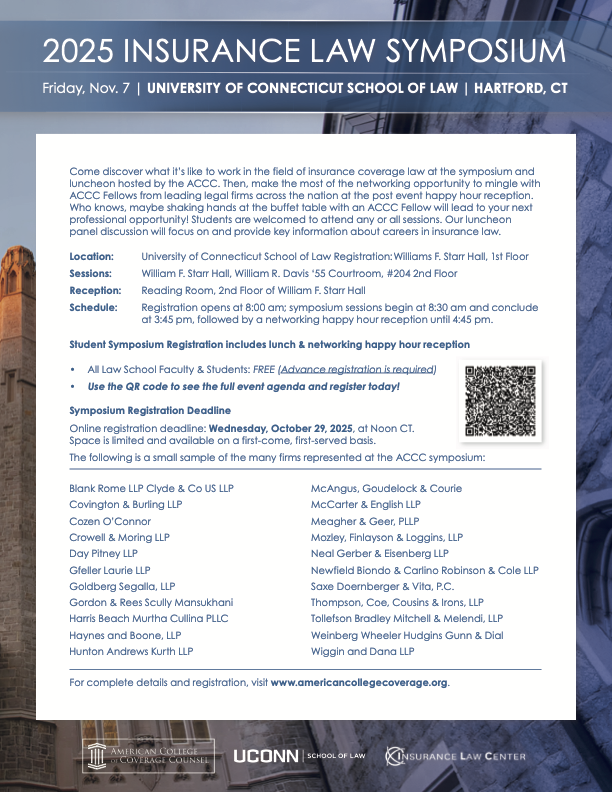Exciting things are on the horizon! Stay tuned for upcoming events hosted by the Insurance Law Center—featuring expert panels, networking opportunities, and timely discussions at the intersection of law, business, and innovation. Check back soon for details!
Faculty Profile: Bill Goddard
As an undergraduate at Dartmouth, Bill Goddard enjoyed working at the student radio station—an experience that later helped shape his early professional life, though his career ultimately took him far from broadcasting.
After earning an MBA, he worked on Wall Street as an investment banker during the era that inspired Wall Street’s Gordon Gekko. “It was one heck of a ride in those days!” says Goddard.
He and a classmate later acquired and expanded a small regional radio company, turning around struggling stations before selling the business. The sale gave him the freedom and resources to pursue a long-standing interest in law. “Founding and selling that company gave me the money to go back to school, and the freedom to study what I wanted,” he says.
Goddard chose the University of Connecticut School of Law because it had the nation’s leading insurance law program—and because he wanted to study with Professor Tom Baker. “I really loaded up,” Goddard recalls. “I took Insurance Regulation, Liability, Transactions, Taxation—the curriculum at the Insurance Law Center gave me an enormous toolkit.”
Baker, now at the University of Pennsylvania Carey Law School, immediately recognized Goddard’s promise. “I still remember meeting Bill during his first semester at UConn,” Baker says. “Right after he left my office, I called up Hal Horwich and told him, ‘You have to hire this guy for next summer.’” Horwich, then a partner at Hebb & Gitlin, initially resisted— “We don’t hire 1Ls for our summer program”—but Baker persisted, and Horwich relented. They did, and they didn’t regret it.
“It’s like a bankruptcy on Mars.” — Hal Horwich, as quoted by Bill Goddard
After law school, Goddard clerked on the Second Circuit for Judge Jon Newman— “the most amazing experience intellectually,” he says. “It was like drinking the law from a firehose.” He then returned to Hebb & Gitlin (later Bingham Dana & Gould, and eventually Bingham McCutchen), where he became an expert in insurance, reinsurance, and insurance insolvency. His banking background proved invaluable during major insolvency proceedings, especially during the 2008 financial crisis.
Baker kept an eye on his former student’s career. “And as soon as it was decent, we brought him back to UConn to teach,” Baker recalls. Goddard joined as an adjunct professor in 2008, now marking his eighteenth year in that role.
“I drink my own Kool-Aid,” Goddard says. “Insurance is an elaborate legal structure built around betting on fortuitous events—and who doesn’t like betting on fortuitous events?”
For his first decade teaching at UConn Law, he co-taught Insurance Litigation with John Buchanan and Stuart Rosen (now a Connecticut Superior Court judge). In 2016, he was asked to develop and teach a course on Insurance Solvency Regulation. “When it comes to insurance, I’m always happy to rise to the occasion,” he says. The course quickly became a staple and a student favorite.
“Instead of going bankrupt, insurance companies that fail enter into insolvency proceedings. The process is governed by regulations in individual states rather than the federal bankruptcy code,” explains Goddard. “European lawyers just giggle—our system makes no sense to them. It’s like a bankruptcy on Mars,” he adds, quoting his former mentor Hal Horwich.
In the class, students dissect the structure of the U.S. regulatory system and put themselves in the shoes of regulators or legislators, debating how to address complex, real-world case studies. These “yeasty intellectual questions,” as Goddard calls them, raise constitutional and sovereignty issues that make the subject ideal for deep legal analysis.
Regulators, examiners, and representatives from the Federal Reserve are regular visitors. “So many of the rules and practices of insurance insolvency just aren’t written down,” says Goddard. “Talking directly with regulators gives students that subjective feel and a better overall understanding of the enterprise.”
David Axinn, Special Deputy Superintendent at the New York Liquidation Bureau—and now co-instructor of the Insurance Solvency course—is a frequent classroom collaborator. “Bill makes the case that insolvency is the key to understanding insurance regulation,” Axinn says. “He is a lone voice in the insolvency wilderness.”
Former student Alison Weir, now a staff attorney at Greater Hartford Legal Aid, says, “Insurance solvency sounded pretty dry initially, but it’s so much more dynamic than I had imagined.”
Technological change continues to reshape the insurance world. Goddard had planned to teach a course on insurance technology outside of UConn Law, but when that did not go forward, the Law School then greenlit his new offering, InsurTech Start-up Law, now in its second year.
Goddard hopes more students will explore insurance law’s breadth and impact. “UConn Law and the Insurance Law Center have been wonderful places for people like me,” he says. “Whether it leads you to government service, the insurance industry, or private practice, insurance makes for a fulfilling and rewarding career.”
ACCC Insurance Law Symposium
Friday, November 7th, 2025
University of Connecticut School of Law
39 Elizabeth Street
Hartford, Connecticut
The University of Connecticut School of Law is honored to host the 2025 American College of Coverage Counsel (ACCC) Insurance Law Symposium, the only ACCC event open to non-Fellows. This program brings together leaders in insurance law to discuss emerging issues, share expertise, and foster professional connections.
Alumni of UConn Law enjoy a special discounted registration rate of $225 (regular rate: $300). Faculty and students may attend all or any portion of the symposium at no charge, with advance registration required for planning purposes.
Don’t miss this unique opportunity to join a national conversation in the field of insurance law—right here in Hartford.
Fall Insurance Law Center Cocktail Reception
Thursday, September 25
5 – 6:30 p.m.
Hosmer Hall Quad
University of Connecticut School of Law
39 Elizabeth Street
Hartford, Connecticut
In case of inclement weather, the reception will be held in Janet M. Blumberg Hall.
You’re invited to join the Insurance Law Center at the UConn School of Law for a gathering of insurance LLM students, faculty, alumni and insurance professionals. Please register by September 15th.
2025 Cocktail Reception Registration
Register for the Insurance Law Center's Fall Cocktail Reception using the form below:
UConn Law, UMN Host Groundbreaking Conference on AI and Insurance
UConn Law and University of Minnesota Successfully Host Groundbreaking Conference on AI and Insurance
HARTFORD, Conn. (May 31, 2025) – The Insurance Law Center at UConn Law, in partnership with the University of Minnesota Law School, successfully hosted a conference on “AI, Insurance Law, and Regulation” on May 30, 2025, at UConn School of Law’s Hartford campus.
The hybrid event brought together more than 200 leading academics, practitioners, regulators, and students to explore critical issues at the intersection of artificial intelligence and insurance law. Attendees participated both in-person and virtually, examining how AI is transforming the insurance industry and its regulatory landscape.
“The intersection of AI and insurance law raises profound questions that will shape the industry for decades. This conference was really exciting and unique. It brought together the field’s leading thinkers for focused, sustained dialogue rather than the fragmented discussions happening elsewhere. The energy in the room was extraordinary. You could feel that we were witnessing a pivotal moment that will influence how America regulates and insures AI risks for years to come,” said Travis Pantin, Director of the Insurance Law Center at UConn Law.
The day-long conference featured four expert panels addressing crucial topics including how insurance can influence AI development and liability frameworks, current and future insurance coverage for AI risks, discrimination and bias concerns in AI-powered insurance systems, and the use of generative AI in insurance coverage drafting and disputes.
Notable speakers included legal scholars from Yale, NYU, University of Pennsylvania, alongside cutting-edge industry leaders, and regulatory experts.
“We are excited to engage with this elite community to tackle the new AI insurance category with the best legal and academic minds in the world,” said George Lewin-Smith of Testudo, a new insurance company developing insurance coverage for AI risks..
The conference also offered a practical lunchtime session on using AI tools in legal practice, providing continuing legal education credits for attorneys.
“This conference has brought together leading voices in AI, insurance, and tort law for an impactful discussion,” said Renee Henson of the University of Missouri School of Law. “With insurance poised to play a central role in AI regulation, the conference arrived at a pivotal moment, one that will no doubt inspire richer, sharper scholarship in this rapidly evolving space.”
Tom Baker of the University of Pennsylvania Carey Law School added, “It was exciting to hear how insurance entrepreneurs are tooling up to face the threats and opportunities that AI will present.”
“The Connecticut Insurance Law Center brought together a coalition of informed, intelligent, and creative thinkers from a variety of perspectives to discuss Artificial Intelligence, the Law, and Insurance. Participating in this critically important discussion was a pleasure and honor,” said Joan Schmit of the University of Wisconsin-Madison.
Philip Dawson of Armilla AI Insurance and Risk Management said, “The conference, which featured leading scholars, legal and industry experts in AI, insurance, and liability, underscored that innovation in AI-specific underwriting and affirmative coverage is accelerating more rapidly than expected.”
The Insurance Law Center plans to publish selected conference papers in a special symposium issue of the Connecticut Insurance Law Journal, further contributing to scholarship in this rapidly evolving field.
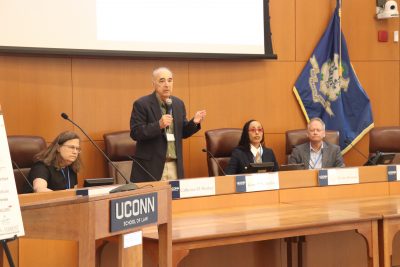
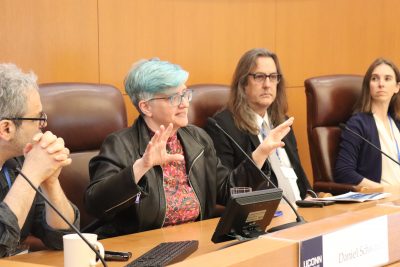
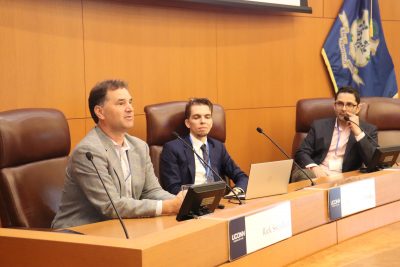
Conference: AI, Insurance Law, and Regulation
A Conference Presented by the Insurance Law Center at UConn Law & the University of Minnesota Law School
AI, Insurance Law, and Regulation
Friday, May 30, 2025
9 a.m. – 5:30 p.m. ET
UConn School of Law, Hartford Campus
Virtual and In-Person
The Insurance Law Center at UConn Law, in conjunction with the University of Minnesota Law School, is pleased to welcome academics, practitioners, regulators, and students to a conference focusing on issues that arise at the intersection of insurance and artificial intelligence. We hope you can join us.
Details
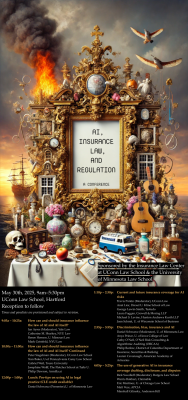
- Call for Papers: Whether or not you participate or attend, we encourage anyone with a relevant paper to submit to it for potential publication of a symposium issue of the Connecticut Insurance Law Journal. If you are interested in submitting a paper, please send an abstract to ilc@uconn.edu and cilj@uconn.edu no later than April 15, 2025. Contributions of any length are welcome, and shorter essays (roughly 4,000 to 6,000 words) are particularly encouraged.
- Location: The event will be held at the UConn School of Law, 55 Elizabeth Street, in the William F. Starr HallReading Room. Official location information is here. The precise Google Maps location is here. Metered parking is available, as well as free on-street parking.
- Hotels: We have arranged a discounted rate of $299/night with the Delamar Hotel West Hartford. To book at this rate, please use the following link (Code is: UNIV052925). Another convenient option is the Hartford Marriott Downtown.
- Remote attendance: Virtual attendance will be allowed for all portions of the event except the lunch practicum. To attend virtually, please register.
- CLE Credits: One hour of Continued Learning Credit will be available for those admitted to the bar in Connecticut, Ohio, Minnesota, and New York who attend the lunchtimepracticum.
- Questions: Please email ilc@uconn.edu.
- Webinar Information:
-
- Date and time:
Friday, May 30, 2025 9:00 AM | (UTC-04:00) Eastern Time (US & Canada) - Join link:
https://uconnvtc.webex.com/uconnvtc/j.php?MTID=m1536b42e95e976ccfa836f7401efe6d4 - Webinar number:
2865 818 4141 - Webinar password:
ilc2025 (4522025 when dialing from a phone or video system) - Join by phone
+1-415-655-0002 US TollWebinar Information: - Access code:
286 581 84141
- Date and time:
Agenda
(Revised 5/20/2025)
8:30a – 9:00a: Registration (30 mins)
9:00a – 9:05a: Opening Remarks (5 mins)
9:05a – 10:25a: Panel 1A: How can and should insurance influence the law of AI and AI itself? (80 mins)
This panel will explore how liability for AI-related harms should take into account the current and future availability and structure of liability insurance. Key questions include:
- Should AI liability frameworks be designed to avoid exposing potentially judgment-proof firms to uninsurable risks?
- Should governments encourage or mandate liability insurance for firms exposed to specific AI-related risks?
- Should AI liability frameworks incorporate factors insurers can evaluate during underwriting and rating, such as safe harbors for AI systems that perform at least as safely as human-operated systems?
Ian Ayres (Moderator), Yale Law School
Catherine M. Sharkey, New York University School of Law
Kenneth S. Abraham, University of Virginia School of Law
Renee Henson, University of Missouri School of Law
Mark Geistfeld, New York University School of Law
10:25a – 10:30a: Break (5 mins)
10:30a – 11:50a: Panel 1B: How can and should insurance influence the law of AI and AI itself? (Continued) (80 mins)
Peter Siegelman (Moderator), University of Connecticut Law School
Tom Baker, University of Pennsylvania Carey Law School
Gabriel Weil, Touro University Jacob D. Fuchsberg Law Center
Josephine Wolff, The Fletcher School at Tufts University
Philip Dawson, Armilla.ai
11:50a – 12:00p: Break (10 mins)
12:00p – 1:00p: LUNCH: Pro-tips on using AI in legal practice (60 mins)
Join us for a lunch session highlighting the latest AI tools designed for legal professionals, with a focus on practical integration into legal practice. The discussion will cover key AI use cases, potential risks and ethical considerations, foundational AI models, and specialized legal models such as Co-Counsel and Vincent. Additionally, the session will present the most recent data and developments in AI to help lawyers navigate this evolving technology responsibly and effectively. Special attention will be given to the ethical obligations of attorneys when adopting AI, ensuring compliance with professional standards and safeguarding client confidentiality. Connecticut, Ohio, Minnesota, and New York CLE credits will be available.
Daniel Schwarcz (Presenter), University of Minnesota Law School
1:00p – 1:10p: Break (10 mins)
1:10a – 2:30p: Panel 2: Current and future insurance coverage for AI risks (80 mins)
This panel will explore how the evolution of AI liability will affect insurance markets. Key questions include:
- Will specialized AI liability policies emerge as AI risks evolve?
- To what extent do current liability insurance policies cover AI-related risks, and does this expose insurers to unpriced risks?
- How can insurers obtain consistent and standardized data on AI risks to efficiently underwrite, rate firms, and incentivize risk-reducing innovation?
Travis Pantin (Moderator), University of Connecticut School of Law
Anat Lior, Drexel University Kline School of Law
George Lewin-Smith, Testudo
Laura Foggan, Crowell & Moring LLP
Michael S. Levine, Hunton Andrews Kurth LLP
Joan Schmit, University of Wisconsin School of Business
2:30p – 2:35p: Break (5 mins)
2:35p – 3:55p: Panel 3: Discrimination, bias, insurance and AI (80 mins)
This panel will explore how the use of new types of AI in the insurance industry can and should be regulated. Key questions include:
- When does the use of AI to discriminate among policyholders raise legal or regulatory issues?
- To what extent should insurance laws and regulations be updated to reflect AI risks?
- How should internal and external audits of insurers evaluate the risks of AI bias and discrimination?
- What problems and opportunities have efforts to regulate AI bias and discrimination surfaced in the insurance setting?
Daniel Schwarcz (Moderator), University of Minnesota Law School
Anya Prince, University of Iowa College of Law
Cathy O’Neil, O’Neil Risk Consulting & Algorithmic Auditing (ORCAA)
Philip Barlow, District of Columbia Department of Insurance, Securities & Banking
Lauren Cavanaugh, American Academy of Actuaries
3:55p – 4:05p: Break (10 mins)
4:05p – 5:25p: Panel 4: The use of generative AI in insurance coverage drafting, disclosure, and disputes (80 mins)
This panel will explore how generative AI will impact the drafting, interpretation, and disclosure of insurance policy terms. It will also explore the use of generative AI in the context of insurance coverage disputes. Key questions include:
- How can and should generative AI be used to interpret insurance policies?
- Can generative AI improve policyholder understanding of Insurance?
- Will generative AI disrupt the sale and distribution of insurance?
- How can generative AI be used by insurers and insureds in the resolution of insurance disputes?
Rick Swedloff (Moderator), Rutgers Law School
Warris Bokhari, Claimable
Eric Martínez, University of Chicago Law School
Matt Vece, American Property Casualty Insurance Association
Marshall Gilinsky, Anderson Kill
5:25p – 5:30p: Closing remarks (5 mins)
5:30p – 6:20p: Reception (50 mins)
Sponsored by:
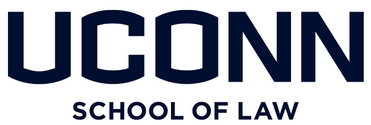
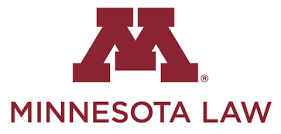
ILC to Welcome Dr. Oliver Brand for Lunchtime Lecture
ILC Hosts Lunchtime Lecture with Prof. Margarida Lima Rego
The Insurance Law Center at UConn Law
is pleased to invite you to a lunchtime lecture by
Margarida Lima Rego
Professor, Nova School of Law, Lisbon
on the topic of
“Digital Transformation in Insurance: The Contract-as-Product Approach to Overcoming Information Overload”
on
Tuesday, February 4th, 12:30pm ET
Hosmer Hall, Ground Floor Conference Room (next to Faculty Lounge)
Lunch will be provided. Remote option available upon registration.
Please Register by Friday 1/31
Abstract:
This paper discusses how digital transformation is pushing the traditional model of contract formation into obsolescence. It argues that, largely as a consequence of the digital transformation and the inherent information overload, formal adherence to that model has slowly but steadily numbed everyone into mechanically declaring that they have read, understood, and agreed to a growing number of boilerplate or standard terms. This raises questions about whether these agreements are still contractual in nature. The chapter focuses on the recent product oversight and governance requirements in EU Law. It is submitted that the adoption of a contract-as-product approach is better equipped to protect insurance customers than transparency requirements based on the proliferation of information duties, given that most will choose not to assimilate the information that is so abundantly provided to them, this being an increasingly rational choice in view of the growing information overload. The contract-as-product approach also opens the door to the questioning of the contractual nature of standard terms, entailing some measure of recognition that they are often closer to a supplier’s instruction manuals than to the product of a meeting of the contract parties’ minds.
Full paper available for download here.
ILC Calls for Papers for Upcoming Insurance Law and AI Conference
Advisory Committee Appointed for the Insurance Law Journal
The Connecticut Insurance Law Journal is proud to announce the creation of an Advisory Committee for the Journal. The Committee is composed of preeminent insurance scholars from around the country. The current members of the Advisory Committee are:
- Kenneth Abraham, University of Virginia School of Law, David and Mary Harrison Distinguished Professor of Law
- Tom Baker, University of Pennsylvania Carey School of Law, William Maul Measey Professor of Law
- Allison Hoffman, University of Pennsylvania Carey School of Law, Professor of Law
- Kyle Logue, University of Michigan Law School, Interim Dean and Douglas A. Kahn Collegiate Professor of Law
- Adam Scales, Rutgers Law School, Professor of Law
- Daniel Schwarcz, University of Minnesota Law School, Frederickson & Byron Professor of Law
- Peter Siegelman, University of Connecticut School of Law, Phillip I. Blumberg Professor of Law
- Jeffrey Stempel, William S. Boyd School of Law, Doris S. and Theodore B. Lee Professor of Law
The members of the Advisory Committee will counsel the CILJ leadership on important decisions facing the Journal, including its peer review process and the selection of symposium topics. We invite you to learn more about the Committee, its roles and responsibilities, and its members on our Advisory Committee section of the website.
